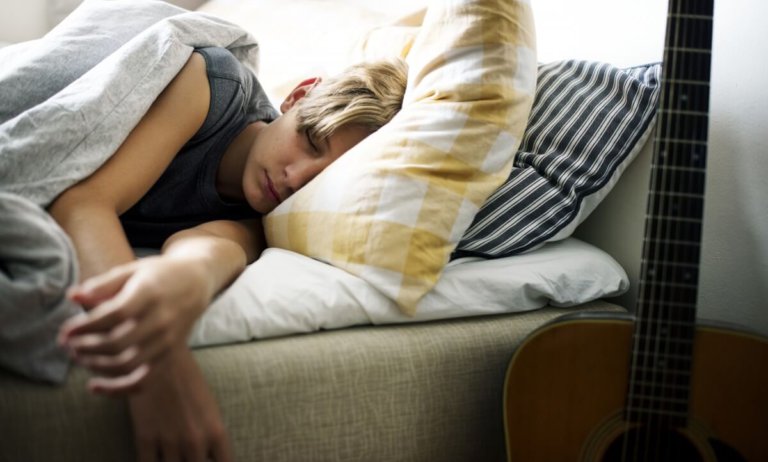
Teenagers are notorious for sleeping in and taking long afternoon naps, much to the exasperation of their parents. But it could be because they aren’t getting enough sleep in the first place.
A study has found that teenagers actually need to sleep more because it’s beneficial for their brain development.
Too little sleep can lead to sleep deprivation, which affects your cognitive abilities and memory retention.
Many teenagers might also be prone to sleeping in and napping on weekends because they’re chronically sleep-deprived.
Source: Giphy
Due to mountains of homework, exams and busy schedules packed with extra-curricular activities, many are not getting the amount of sleep they should.
According to a study by Nature, “Sleep after learning stabilizes and integrates memories for long-term storage, while sleep prior to learning prepares the brain to encode new information.
“However, many adolescents obtain insufficient sleep, with 68% of teenagers in the US reporting sleep below the recommended 8–10 h each night.”
According to EducationDive, melatonin in teenagers doen’t kick in until 11pm, which is why many get into the habit of sleeping late.
This has led to more school districts in the US experimenting with starting high school later on, but it will take time for other schools to follow suit.
How can parents ensure their teenagers sleep enough?
Did you get enough sleep last week? — Free online resources for children and teenagers, their parents, carers and health professionals.https://t.co/R3K2bF5Mw0
— Flinders University (@Flinders) August 12, 2019
The Center for Disease Control suggests encouraging them to stick to a consistent sleep schedule during the school week and weekends.
“This means going to bed at the same time each night and getting up at the same time each morning. Adolescents whose parents set bedtimes are more likely to get enough sleep. To help decide on a good bedtime for your child, go to the Bedtime Calculator.”
Naps are also an ideal way to combat lack of sleep due to early waking times. The study found that those who slept only five hours at night but were given a 1.5 hour nap at 2pm were able to remember pictures and facts better than students who slept 6.5 hours a night.
Teenagers sleep less because of their electronic devices
A new study found that 68% of teenagers take their devices into the bedroom and almost 1/3 of teens sleep with the phones in bed.@tvkatesnow reports on how phones are impacting our ability to sleep. pic.twitter.com/j2DtiSXu6E
— TODAY (@TODAYshow) May 29, 2019
Limiting their use of electronic devices and social media is also a good idea. A study done in the UK by Russell Viner at the University College of London Great Ormond Street Institute of Child Health found that girls are particularly prone to lack of sleep and physical activity due to extensive social media usage and cyber-bulling.
He said, “Parents get tied up in knots about how much their kids are on social media each day. But they should worry about how much physical activity and sleep they’re getting, because social media is displacing other things.”
Similar findings were found by San Diego researchers. According to their study, Gen Z teens who spend a lot of time on their phones decrease their chances of getting a good night’s sleep.
As the AJC reported, “Teens who spent 5 hours online per day were almost around 50 percent more likely not to get even seven hours of sleep per night when compared to teens who had just an hour of screen time per day.
“And technology usage close to bedtime, which is almost synonymous with the stereotypical teen social experience, puts good sleep even further out of reach.
“Using cell phones, television, video games or computers right before bed also made it far more likely that a teen would wake up to text in the middle of the night and experience increased levels of morning fatigue.”
So parents, it’s time to put your older kids to bed earlier, encourage them to take brief naps during the day, and make sure they aren’t glued to their screens close to bedtime.
Doing so ensures they get enough sleep so they can do better in school, as well as building good sleeping habits that will last a lifetime.
Liked this? Then you’ll love…
The impact of sleep on academic performance
A lesser-known reason why university students aren’t getting enough sleep







